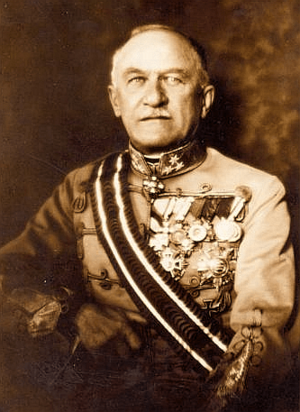Sándor Szurmay facts for kids
Quick facts for kids
Sándor Szurmay
|
|
|---|---|

Sándor Szurmay in Military uniform.
Date Unknown. |
|
| Born | 19 December 1860 Boksánbánya, Kingdom of Hungary |
| Died | 26 February 1945 (aged 84) Budapest, Hungary |
| Allegiance | |
| Years of service | 1882–1921 |
| Rank | Colonel General |
| Battles/wars | World War I |
| Awards | Military Order of Maria Theresa |
Vitéz Baron Sándor Szurmay de Uzsok (born December 19, 1860 – died February 26, 1945) was an important Hungarian military officer and politician. He served as the Minister of Defence for the Hungarian part of the Dual Monarchy of Austria-Hungary from 1917 to 1918. This means he was in charge of the Hungarian army during a very important time.
Sándor Szurmay: A Hungarian Leader
Growing Up and Early Career
Sándor Szurmay was born in 1860 in a place called Boksánbánya. Today, this town is known as Bocşa and is in Romania. He went to a science high school in Szeged, a city in Hungary.
Before joining the army, Sándor worked for a railway company. He started as a trainee and later became an official.
In 1882, he decided to join the military. Szurmay began his service with the Eighteenth Home Defence Battalion in Lugos. He studied at the Ludovica Military Academy, which was a famous military school. After graduating, he became a Second Lieutenant in the Hungarian Army.
Between 1887 and 1889, he attended a special school for staff officers. This school, called the Imperial and Royal Staff College, taught officers how to plan and lead army operations. In 1889, he was promoted to First Lieutenant and worked at the Fourth Army Corps' headquarters in Budapest.
A Leader During World War I
By November 1917, Szurmay had become a very high-ranking general, known as a General der Infanterie. He was also given the important job of Minister of Defence for the Hungarian army, called the Honvéd.
During World War I, Szurmay strongly believed that the armies of Austria and Hungary should be separate. In November 1917, he officially asked for this separation. The next month, at a meeting with the emperor, Charles I, he again pushed for a full division of the joint army. He explained that "all groups in Hungary are united on the issue of a Hungarian army." This idea was discussed again in January 1918, but the decision was put off until the war ended.
 | Jessica Watkins |
 | Robert Henry Lawrence Jr. |
 | Mae Jemison |
 | Sian Proctor |
 | Guion Bluford |

